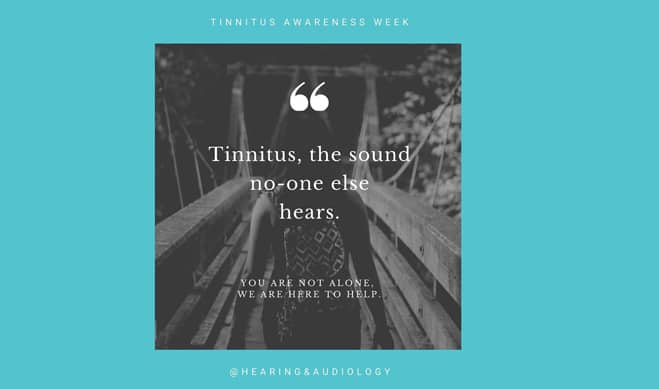Tinnitus and Hearing Awareness Week

Hearing Awareness Week is held each year to coincide with World Hearing Day on 3rd March. Hearing loss is a significant issue in Australia, costing $15 billion each year. Hearing loss is more common than heart disease, cancer and diabetes, and affects 70% of people over the age of 70.
Tinnitus can be both a cause and a side effect of hearing loss and affects around 18% of the Australian population.
What is tinnitus?
Tinnitus is the perception of noise inside the head or ear, including ringing, buzzing, humming, hissing, roaring, or rushing, heard in either one or both ears. Occasionally, it can be the sound of music playing, particularly in older people.
For some people, tinnitus is constant, while for others, it comes and goes. It can sound to the sufferer as if it is coming from somewhere external, or it can be clear that it is from inside the head.
The noise that tinnitus sufferers can hear is not caused by any outside source but comes from a fault in the auditory system. It can be mild, causing annoyance but not interfering in everyday life.
It can also be severe and debilitating. Tinnitus sufferers may experience poor concentration, fatigue and sleeping problems, stress, irritability, memory problems, anxiety and depression.
Causes of tinnitus
It has no single cause and can be a symptom of a number of underlying disorders. Depending on the cause it may be possible to treat or reduce tinnitus symptoms, while for others symptoms can be managed. People who have hearing loss are more likely to experience tinnitus, but it can affect anyone, of any age. Men are slightly more likely to have tinnitus than women.
Some common causes of tinnitus include:
Long-term exposure to loud noises
The ringing in your ears that you may have experienced following a loud music concert is a form of short-term tinnitus. It usually goes away within a few hours, but consistent exposure to loud noise, whether music or industrial equipment, can cause permanent tinnitus.
Age
Like other hearing problems, age can lead to tinnitus developing in later life. It tends to develop gradually as the ear’s delicate tissue degrades over time, particularly after age 60.
Infection
Ear infections can sometimes cause tinnitus. Though this is usually temporary, repeated ear infections and bouts of tinnitus may cause longer-term symptoms. It is important to have the underlying cause of recurring ear infections investigated.
Earwax
We all need some earwax to protect the ear canal, keeping it free of dirt and bacteria. In some people, too much earwax develops, blocking the ear and sometimes causing tinnitus.
Ménière’s Disease
Though it is rare, this inner-ear disease often causes tinnitus, along with vertigo.
Medication
Some types of medication can cause tinnitus, including aspirin, some antibiotics, cancer drugs and antidepressants.
Physical changes to the ear and head
There are a number of physical problems that can cause tinnitus. They include:
- Eustachian tube dysfunction. The tube that connects the ear to the throat stays open rather than closing as it should. This often develops due to pregnancy or weight loss.
- Otosclerosis (stiffening of the ear bones). This condition, which is often inherited, can cause tinnitus as the bones in the ear change and grow abnormally.
- Temporomandibular joint problems. Problems with the joint that connects the jaw to the skull, just below the ear, can lead to tinnitus.
- Tumours. A tumour in the head or neck can lead to increased pressure on the ear, resulting in tinnitus. An acoustic neuroma, or tumour on the cranial nerve, is particularly likely to result in tinnitus, usually in one ear.
- Injuries. A perforated eardrum, which can result from a severe ear infection, loud noise or scuba diving, will often cause tinnitus in one ear. In addition, injuries to the head or neck can lead to tinnitus.
Treatment for tinnitus
Severe tinnitus can be deeply distressing, interfering with how you live your life, causing or exacerbating mental health problems and making it difficult to work. It is important to remember that almost all tinnitus can be effectively treated and improved, even if you have been told in the past that there is nothing that can be done.
Treating and managing tinnitus involves understanding how it works, adapting to the symptoms, and improving your psychological associations with it. The treatment of tinnitus depends on the cause, your lifestyle, your personality, and the severity of the condition. It may be that your tinnitus has a specific, treatable cause that we can identify. If it does not, then we will work out the most appropriate course of action to reduce your symptoms.
At Hearing & Audiology, we are passionate about helping people with tinnitus and know that the majority of tinnitus can be treated with the appropriate expertise and care. Our tinnitus specialists have trained with internationally recognised tinnitus experts so that the most up-to-date advancements in knowledge are passed on to you. At your appointment, we will discuss a personalised treatment and management plan with you, while providing strategies to better deal with your tinnitus symptoms. At the conclusion of all assessments, a written report will be sent to your doctor unless otherwise requested.
To book an appointment with one of our tinnitus specialists, call (08) 9388 8003.


